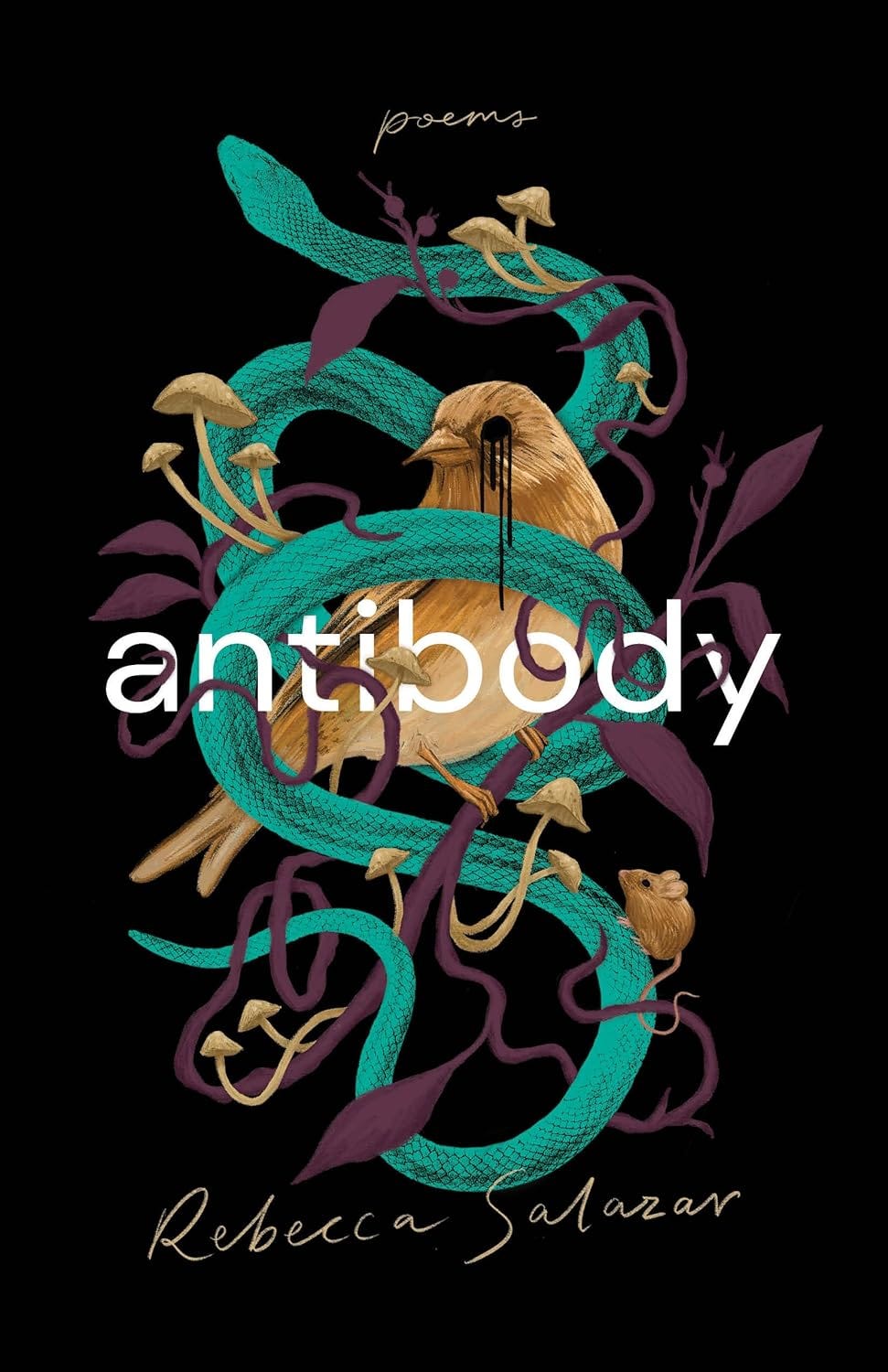antibody: Poems by Rebecca Salazar
Reviewed by Selena Mercuri
antibody by Rebecca Salazar is a powerful reckoning with trauma, language, and survival, where poetic form dissolves under the weight of memory and violence. In the tradition of feminist poetry that refuses to be quiet, Salazar’s work is unrelenting—each poem an incision into the body, each word a form of resistance. antibody is not only about survival, but also about the body’s stubborn refusal to be erased.
This manipulation of text and space reaches its climax in antibody’s final poem, where meaning is violently redacted, leaving behind a chorus of “&, &, &”—a bleak ledger of accumulation, of voices erased, of justice deferred. What is left unsaid is just as devastating as what remains.
Salazar’s poetics are built on disruption, both thematically and formally. The poems in this collection resist linearity, splintering across the page, demanding to be read and re-read. In “Dissociative Loop,” this fragmentation takes on a haunting symmetry: the first letter of each word in each line spells out “PTSD,” embedding the trauma directly into the poem’s structure. “Pray this suicide disease / proceeds through small deaths: / phantom teeth & soft drownings / pretend to sleep, dream.” The poem becomes a cipher of dissociation, a recursive loop of pain and attempted escape. In Salazar’s poems, even form becomes a site of resistance—of speaking the unspeakable.
This manipulation of text and space reaches its climax in antibody’s final poem, where meaning is violently redacted, leaving behind a chorus of “&, &, &”—a bleak ledger of accumulation, of voices erased, of justice deferred. What is left unsaid is just as devastating as what remains. The collection itself seems to ask: if justice is an absence, what does it mean to survive?
But antibody is more than an excavation of harm; it is also a testament to reclamation. Salazar moves between languages, blending Spanish into the text, invoking ancestry, ritual, and ghosts that demand reckoning. In one such poem, she writes: “la cabra aparece y me sigue insistiendo / que empieze los ritos. compels me to obey, / has me now sleepless for a fortnight / foraging for ground cherries, red fruit / now overflows my bathtub, preparation / for the ritual he demands, my bare feet, / stained with berry juice and earth.” The Spanish here asserts itself within an English-dominated text as both rupture and reminder of what persists. These lines conjure ritual, survival, and the body’s inextricable link to the land, marking antibody as a collection deeply rooted in memory and inheritance.
Salazar’s exploration of intimacy and violence is equally unsparing. “Ours was a fabricated love / and I was false. Across the bed / I left burnt poplar bark / and sifted yarrow seeds, / then left my body (it’s a gift).” These lines, simultaneously tender and harrowing, navigate the residue left by love and loss. The poet’s body is something given, something abandoned, something that refuses to disappear. Love, like justice, is not a certainty but a construct, one that can just as easily consume as it can heal.
antibody is a collection that cuts and exposes—it forces its reader to sit with discomfort, with the weight of inherited and lived trauma. Yet, within its darkness, there is also a fierce, unwavering survival. Salazar does not offer solace, but she offers testimony. And sometimes, survival demands nothing less.
About the Author
Rebecca Salazar (she/they) is a queer, disabled, and racialized Latinx writer currently living on the unceded territory of the Wolastoqiyik people. Their first full-length collection sulphurtongue (McClelland & Stewart) was a finalist for the Governor General’s Award for Poetry, the New Brunswick Book Awards, the Atlantic Book Awards, and the League of Canadian Poets’ Pat Lowther Memorial Award. antibody is their second poetry collection.
Book Details
Publisher : McClelland & Stewart
Language : English
Paperback : 160 pages
ISBN-13 : 978-0771020476



